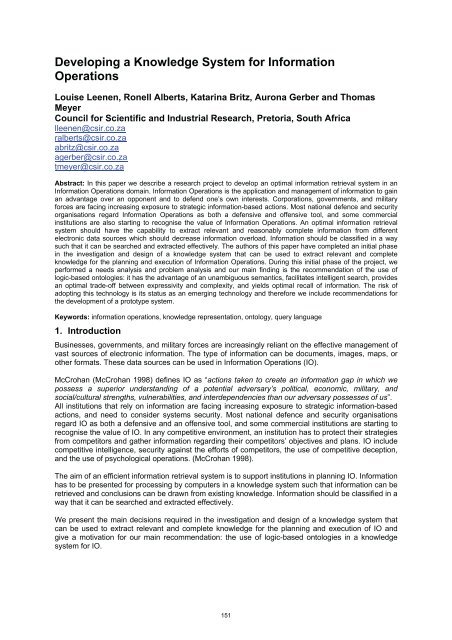6th European Conference - Academic Conferences
6th European Conference - Academic Conferences
6th European Conference - Academic Conferences
Create successful ePaper yourself
Turn your PDF publications into a flip-book with our unique Google optimized e-Paper software.
Developing a Knowledge System for Information<br />
Operations<br />
Louise Leenen, Ronell Alberts, Katarina Britz, Aurona Gerber and Thomas<br />
Meyer<br />
Council for Scientific and Industrial Research, Pretoria, South Africa<br />
lleenen@csir.co.za<br />
ralberts@csir.co.za<br />
abritz@csir.co.za<br />
agerber@csir.co.za<br />
tmeyer@csir.co.za<br />
Abstract: In this paper we describe a research project to develop an optimal information retrieval system in an<br />
Information Operations domain. Information Operations is the application and management of information to gain<br />
an advantage over an opponent and to defend one’s own interests. Corporations, governments, and military<br />
forces are facing increasing exposure to strategic information-based actions. Most national defence and security<br />
organisations regard Information Operations as both a defensive and offensive tool, and some commercial<br />
institutions are also starting to recognise the value of Information Operations. An optimal information retrieval<br />
system should have the capability to extract relevant and reasonably complete information from different<br />
electronic data sources which should decrease information overload. Information should be classified in a way<br />
such that it can be searched and extracted effectively. The authors of this paper have completed an initial phase<br />
in the investigation and design of a knowledge system that can be used to extract relevant and complete<br />
knowledge for the planning and execution of Information Operations. During this initial phase of the project, we<br />
performed a needs analysis and problem analysis and our main finding is the recommendation of the use of<br />
logic-based ontologies: it has the advantage of an unambiguous semantics, facilitates intelligent search, provides<br />
an optimal trade-off between expressivity and complexity, and yields optimal recall of information. The risk of<br />
adopting this technology is its status as an emerging technology and therefore we include recommendations for<br />
the development of a prototype system.<br />
Keywords: information operations, knowledge representation, ontology, query language<br />
1. Introduction<br />
Businesses, governments, and military forces are increasingly reliant on the effective management of<br />
vast sources of electronic information. The type of information can be documents, images, maps, or<br />
other formats. These data sources can be used in Information Operations (IO).<br />
McCrohan (McCrohan 1998) defines IO as “actions taken to create an information gap in which we<br />
possess a superior understanding of a potential adversary’s political, economic, military, and<br />
social/cultural strengths, vulnerabilities, and interdependencies than our adversary possesses of us”.<br />
All institutions that rely on information are facing increasing exposure to strategic information-based<br />
actions, and need to consider systems security. Most national defence and security organisations<br />
regard IO as both a defensive and an offensive tool, and some commercial institutions are starting to<br />
recognise the value of IO. In any competitive environment, an institution has to protect their strategies<br />
from competitors and gather information regarding their competitors’ objectives and plans. IO include<br />
competitive intelligence, security against the efforts of competitors, the use of competitive deception,<br />
and the use of psychological operations. (McCrohan 1998).<br />
The aim of an efficient information retrieval system is to support institutions in planning IO. Information<br />
has to be presented for processing by computers in a knowledge system such that information can be<br />
retrieved and conclusions can be drawn from existing knowledge. Information should be classified in a<br />
way that it can be searched and extracted effectively.<br />
We present the main decisions required in the investigation and design of a knowledge system that<br />
can be used to extract relevant and complete knowledge for the planning and execution of IO and<br />
give a motivation for our main recommendation: the use of logic-based ontologies in a knowledge<br />
system for IO.<br />
151

















